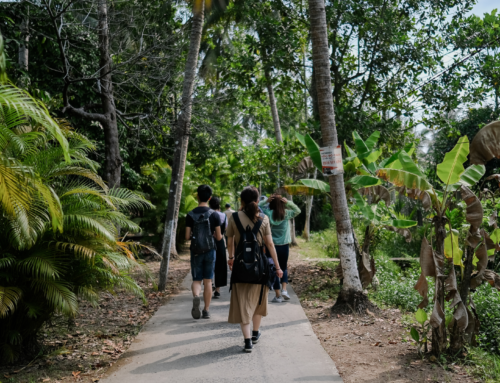Traveling can often disrupt routines, making it challenging to maintain a healthy lifestyle. Many people struggle with finding nutritious food options and staying active while on the go. To stay healthy while traveling, prioritize balanced meals, regular exercise, and adequate hydration.
Planning ahead significantly contributes to a traveler’s well-being. By scouting healthy dining options before the trip and bringing along nutritious snacks, travelers can avoid unhealthy impulsive choices. Incorporating simple workouts like walking or stretching into daily itineraries also helps maintain fitness.
Mindfulness plays a key role in health during travel. Listening to one’s body and making adjustments as necessary can enhance the experience. It’s essential for travelers to stay attentive to their physical needs, ensuring they return home feeling revitalized rather than drained.
Understanding Travel Health Risks
Traveling, while rewarding, can expose individuals to various health risks. Awareness of these risks ensures that travelers can take proactive measures to protect their health. The following sections outline common concerns, personal health considerations, and regional health risks.
Common Health Concerns for Travelers
Travelers may encounter several health issues, ranging from viral infections to foodborne illnesses. Some of the most common concerns include:
- Influenza and Respiratory Infections: Air travel can facilitate the spread of viruses. Exposure to large crowds increases the risk of respiratory infections.
- Gastrointestinal Issues: Contaminated food and water can lead to diseases such as traveler’s diarrhea. Proper sanitation and food choices are essential to minimize risk.
- Vector-Borne Diseases: Mosquitoes and ticks can transmit illnesses like malaria, dengue fever, and Lyme disease. Preventive measures include using insect repellent and wearing suitable clothing.
Awareness of these issues allows travelers to take necessary precautions, such as vaccines and health screenings before departure.
Assessing Personal Health Conditions
Travelers should evaluate their personal health before a trip. Certain medical conditions may require special consideration, including:
- Chronic Illnesses: Conditions like diabetes or heart disease might need ongoing management. Travelers should carry necessary medications and understand how their condition may be affected by travel stress.
- Allergies and Sensitivities: Food allergies can pose significant risks. It is vital to communicate dietary restrictions when dining out and to have necessary medications, such as antihistamines, readily available.
- Mental Health: Stress, anxiety, and other mental health issues can become amplified during travel. Planning and preparation can mitigate these challenges.
Being proactive about personal health can significantly enhance the travel experience.
Regional Health Risks Assessment
Different regions present distinct health risks that travelers must consider. Factors influencing regional health threats include:
- Infectious Diseases: Areas with endemic diseases may require vaccinations or prophylactic medications. For example, yellow fever vaccination may be necessary for travel to certain parts of Africa and South America.
- Environmental Hazards: Travelers should be aware of natural disasters or environmental conditions such as high altitude. These factors can affect physical well-being.
- Healthcare Access: Understanding the availability and quality of healthcare in destination regions is crucial. In case of emergencies, knowing where to seek assistance can save time and prevent complications.
Researching these regional risks provides travelers with the necessary information to make informed decisions and stay healthy while exploring.
Pre-Travel Health Preparations
Preparing for a trip involves important health considerations. Proper vaccinations, insurance coverage, and a well-stocked health kit can significantly enhance travel safety and comfort.
Vaccinations and Prophylaxis
Travelers should check recommended vaccinations for their destination. Common vaccines include:
- Hepatitis A
- Typhoid
- Yellow fever
- Meningococcal disease
Additionally, some locations may require proof of vaccination for entry. Prophylactic medications, such as antimalarials, may also be necessary based on the area. Consulting a healthcare provider at least six weeks before travel can ensure adequate time for vaccinations to take effect. Travelers should carry their vaccine records, which can be crucial for medical care abroad.
Travel Insurance and Health Coverage
Travel insurance is essential for safeguarding against unexpected health issues. Policies should include:
- Emergency medical coverage
- Trip cancellations
- Lost luggage
Before purchasing, verify that the policy covers specific travel activities, such as adventure sports. Also, check for coverage limits and exclusions, especially regarding pre-existing conditions. It is wise for travelers to consider insurance providers with 24/7 assistance for emergencies while abroad. This preparation can significantly ease the burden of unexpected medical expenses.
Packing a Travel Health Kit
A travel health kit is a vital component of trip preparation. Essential items to include are:
- Prescription medications (in original containers)
- Pain relievers (e.g., ibuprofen, acetaminophen)
- Antihistamines for allergies
- First aid supplies (band-aids, antiseptic wipes)
Travelers should tailor their kits based on personal health needs and destination-specific conditions. Additionally, including items like insect repellent and sunscreen can help prevent health issues. Keeping the kit easily accessible in carry-on luggage ensures quick access during emergencies. Regularly reviewing and updating the kit before trips ensure it remains stocked and ready.
Nutritional Strategies for Healthy Travel
Maintaining proper nutrition while traveling requires careful consideration of hydration and food choices. Implementing effective strategies helps to ensure a healthier journey.
Hydration and Avoiding Dehydration
Staying hydrated is crucial during travel. Dehydration can lead to fatigue, headaches, and reduced cognitive function. Travelers should aim to drink at least 8-10 cups of water per day.
When flying, the dry air in the cabin can contribute to dehydration. It’s advisable to drink water before, during, and after the flight. Carrying a reusable water bottle makes it easier to stay hydrated.
Signs of dehydration include dry mouth, dark urine, and dizziness. To prevent dehydration, travelers should also consume foods with high water content, such as fruits and vegetables. Frequent breaks for hydration can support overall health.
Choosing Safe and Healthy Foods
Selecting safe and nutritious foods is essential while traveling. Unfamiliar cuisines may pose risks, so it’s important to choose wisely. Eating at reputable restaurants reduces the chance of foodborne illnesses.
Travelers should prioritize whole foods like fruits, nuts, and whole grains—these provide essential nutrients and energy. Pack healthy snacks to avoid impulsive choices at airports or roadside stops.
Reading labels and checking for allergens is also important. When in doubt, opt for cooked dishes over raw to minimize risks. This approach enhances safety and boosts overall health during travel.
Physical Well-Being While on the Move
Maintaining physical well-being during travel is crucial for enhancing the overall experience. Focus on staying active and managing sleep quality to ensure energy and comfort throughout the journey.
Staying Active During Travel
Incorporating physical activity into travel routines is essential. Opportunities for movement can be easily integrated into daily plans. For instance, walking tours allow travelers to explore new locations while keeping active.
Choosing accommodations with fitness centers or nearby parks provides options for structured exercise. Even brief workouts, such as 15-20 minutes of bodyweight exercises, can significantly enhance well-being.
Travelers may also consider using fitness apps to track steps or guide short workouts. Simple actions like taking the stairs, stretching during flights, or scheduling short walks can make a difference.
Combating Jet Lag and Sleep Quality
Jet lag affects many travelers, leading to fatigue and reduced alertness. To manage this, adjusting sleep schedules before departure can help align the body’s internal clock.
Staying hydrated during flights aids in minimizing fatigue. Travelers should avoid excessive caffeine and alcohol, which can disturb sleep patterns.
Implementing a calming bedtime routine, such as reading or meditating, encourages better sleep quality. Using sleep masks and earplugs can further enhance rest during unfamiliar environments.
Managing light exposure is also beneficial; seeking natural light during the day aids in resetting circadian rhythms. By prioritizing these strategies, travelers can effectively combat jet lag and promote restful sleep.
Personal Hygiene and Disease Prevention
Maintaining personal hygiene and practicing disease prevention strategies are essential for a healthy travel experience. Focus on effective hand hygiene and insect protection to minimize health risks while on the go.
Hand Hygiene and Respiratory Etiquette
Hand hygiene is critical for preventing the spread of germs. Travelers should wash their hands with soap and water for at least 20 seconds, especially before eating or after using the restroom. When soap and water are not available, alcohol-based hand sanitizers with at least 60% alcohol can be effective alternatives.
To reduce the risk of respiratory illnesses, individuals should practice respiratory etiquette. This includes covering the mouth and nose with a tissue or elbow when sneezing or coughing. Proper disposal of tissues and frequent handwashing afterward can further limit germ transmission. Wearing masks in crowded places can also offer additional protection.
Insect Bite Protection
Insect bites can transmit diseases such as malaria, dengue fever, and Zika virus. To protect against insect bites, travelers should use insect repellents that contain DEET, picaridin, or oil of lemon eucalyptus. Applying repellent to exposed skin and clothing is crucial.
Wearing long sleeves and pants can provide a barrier against bites, especially during dawn and dusk when many insects are most active. Travelers should also use bed nets treated with insecticide when sleeping in areas where insects are prevalent. Staying in accommodations with air conditioning or window screens can further reduce exposure.
Managing Medical Conditions Abroad
Traveling with medical conditions requires careful planning to ensure safety and wellness. Proper management of prescriptions and knowing how to access healthcare services in unfamiliar locations are crucial steps for travelers.
Handling Prescriptions and Medications
Travelers must ensure they have adequate supplies of prescribed medications. It’s essential to carry a sufficient quantity for the duration of the trip, plus additional doses for unexpected delays.
Important steps include:
- Consulting Healthcare Providers: Before departure, a traveler should discuss plans with their healthcare provider. This conversation should cover potential issues related to traveling, including itinerary and storage needs for medications.
- Obtaining Documentation: A letter from a healthcare professional detailing the medical condition, prescribed medications, and dosages can simplify customs processes.
- Researching Local Laws: Some medications may be restricted or require special documentation in other countries. Checking regulations beforehand can prevent complications at borders.
Locating Healthcare Services Overseas
Finding quality healthcare while traveling can be a challenge, especially in emergencies. Travelers should familiarize themselves with healthcare options in their destination.
Consider the following strategies:
- Using Technology: Health-related apps or websites can provide up-to-date information on local hospitals and clinics. Some apps allow users to search for services by specialty or language.
- Emergency Numbers: Before traveling, knowing the local emergency number is vital. These numbers can differ significantly around the world.
- Travel Insurance: Choosing a travel insurance plan with medical coverage ensures access to necessary health services. Look for plans that cover emergency evacuation or repatriation.
By preparing for medication management and healthcare access, travelers can better handle medical conditions while abroad.
Mental Health and Travel
Travel can be a source of stress and emotional upheaval, as well as joy and adventure. Navigating these complexities requires awareness and proactive strategies to maintain mental well-being.
Coping with Travel Stress
Travel stress can stem from various sources, including delayed flights, unfamiliar environments, and logistical challenges. Implementing practical coping strategies is essential.
- Planning Ahead: Creating a comprehensive itinerary can minimize uncertainty. This includes booking accommodations, researching local customs, and noting emergency contacts.
- Mindfulness: Practicing mindfulness techniques, such as deep breathing or meditation, helps ground individuals. Setting aside a few minutes each day for these activities enables travelers to manage anxiety effectively.
- Stay Hydrated and Nourished: Physical health impacts mental health. Drinking water and eating balanced meals can bolster energy levels and mood.
Cultural Adjustment and Homesickness
Cultural adjustment is a common challenge that travelers face when visiting new places. Encountering unfamiliar customs, languages, and social norms can be overwhelming.
- Embrace Local Culture: Engaging with locals can ease the transition by fostering connections and understanding. This can involve trying regional foods, participating in local events, or learning a few key phrases in the local language.
- Stay Connected: Regular communication with family and friends back home can alleviate homesickness. Scheduling video calls or sending messages ensures emotional support continues.
- Identify a Safe Space: Finding a familiar place, like a favorite coffee shop or park, allows for respite amidst the chaos. This sanctuary assists in processing feelings and adjusting to new experiences.
Travel Health Resources
Access to reliable travel health resources is vital for maintaining well-being while on the move. Several platforms and organizations provide comprehensive information and support for travelers regarding health risks, vaccinations, and emergency services.
Websites and Apps for Healthy Travel
Numerous websites and mobile applications are designed to assist travelers in staying healthy. Some notable options include:
- CDC Travelers’ Health: The Centers for Disease Control and Prevention offers detailed information about health risks by destination, vaccination requirements, and travel advisories.
- Travel Health Pro: This UK-based platform provides resources on routine and travel vaccinations, health alerts, and advice for various destinations.
- WHO International Travel and Health: The World Health Organization supplies updates on disease outbreaks and health recommendations for specific regions.
Apps like Travel Safe and MyTravelHealth offer emergency contacts, nearby medical facilities, and safety tips. These resources serve as essential tools for personal health management during travel.
Contact Information for Embassies and Consulates
Knowing how to contact local embassies and consulates is crucial for travelers facing health emergencies or legal issues. Each country maintains an official website listing its diplomatic missions, complete with contact information.
Travelers should note:
- Emergency Contact Numbers: Record the local emergency number and embassy or consulate information before departure.
- Services Provided: Embassies can assist with lost passports, medical emergencies, and other urgent situations.
It’s advantageous to have this information readily available on one’s mobile device or in travel documents for quick access. Being informed ensures travelers can receive timely assistance when needed.





Leave A Comment